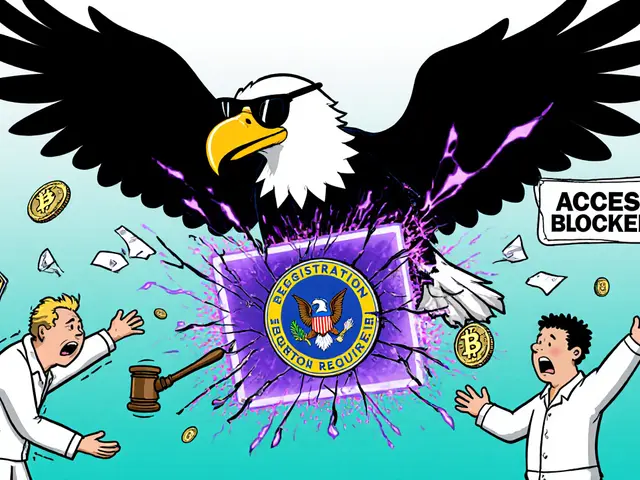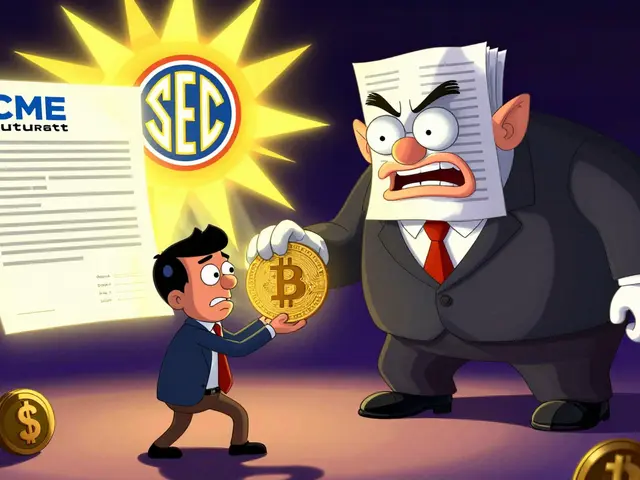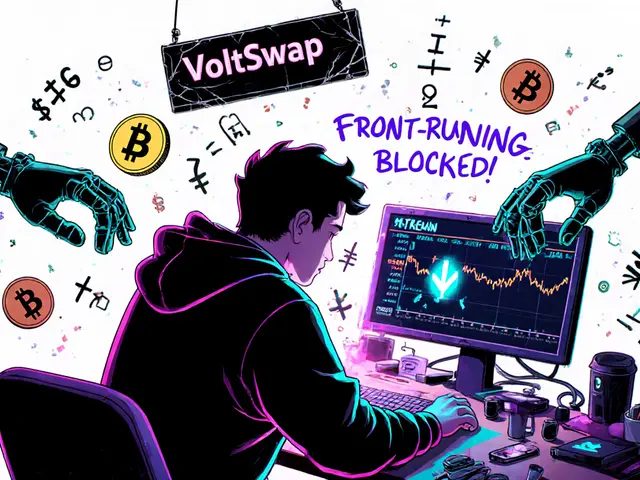COREDAX Eligibility Checker
Is COREDAX Right for You?
This tool checks if you qualify for COREDAX based on key requirements from the article. Answer these questions to see if you're eligible.
When you're looking for a crypto exchange in South Korea, you don't just want another platform that lists Bitcoin and Ethereum. You want one that understands local rules, speaks your language, and doesn't make you jump through hoops just to deposit money. That’s where COREDAX comes in. But is it actually good for you - especially if you're not based in Korea?
What Is COREDAX, Really?
COREDAX is a South Korean cryptocurrency exchange that started in 2020. It wasn’t built to compete with Binance or Coinbase globally. Instead, it was made for Korean retail traders who care more about compliance than flashy features. It’s regulated under South Korea’s Virtual Asset User Protection Act, which came into force in July 2023. That means it has to prove it holds your coins, run background checks on users, and keep your funds separate from its own money. Most exchanges outside Korea don’t have to do this - but COREDAX does. And that’s a big deal.
It’s not the biggest exchange in Korea. It ranks fourth, behind Upbit, Bithumb, and Korbit. But it holds its own with about 6.2% of the country’s daily $3.2 billion crypto trading volume. That’s not small. It’s also not growing fast. Its user base is mostly Korean, aged 25 to 44. Institutional investors barely use it. If you’re a Korean individual trader, COREDAX is a solid option. If you’re from the U.S., Europe, or anywhere else, you’ll hit walls fast.
Fees and Deposit Options: Simple, But Restrictive
COREDAX doesn’t make you guess how much you’ll pay. Withdrawal fees are fixed: 0.001 BTC for Bitcoin. That’s higher than Binance (0.0005 BTC) and Upbit (0.0004 BTC). For altcoins, fees vary but are generally in line with regional peers. Trading fees are standard - 0.15% for makers and takers. No discounts for holding tokens. No tiered pricing. You pay what’s listed.
Here’s where it gets tricky: you can only deposit fiat money via bank wire in Korean Won (KRW). Minimum deposit? ₩50,000 - about $38. No credit cards. No PayPal. No Apple Pay. Nothing else. If you’re trying to buy crypto from abroad, you’re stuck. You need a Korean bank account. That’s not a bug - it’s by design. The exchange avoids international payment processors to stay compliant with Korea’s strict anti-money laundering laws.
Processing times for deposits? Around 1.8 business days. That’s slower than Upbit’s half-day average. If you’re used to instant buys on Coinbase, this will feel archaic. But for Koreans who trust local banks and don’t mind waiting, it’s acceptable. International users? You’ll likely give up before you even start.
Platform and App: Solid for Locals, Tough for Outsiders
COREDAX offers both a desktop platform and a mobile app. The desktop version works on Windows 10+ and macOS 11+. It needs a screen resolution of at least 1366x768 - nothing fancy. The interface isn’t as polished as Binance’s, but it’s functional. Charts load fast. Order types are standard: market, limit, stop-limit. No margin trading or futures. No derivatives. Just spot trading.
The mobile app is where most users live. It’s on both iOS and Android, with biometric login, real-time alerts, and price notifications. It has a 4.1/5 rating on Google Play from over 1,200 reviews. But users complain about lag during market spikes. If Bitcoin drops 10% in five minutes, the app might freeze. That’s not unique to COREDAX - it happens on most exchanges during volatility. But when you’re trying to sell, every second counts.
Here’s the catch: everything is in Korean. The website, the app, the help center. There’s a partial English translation for basic functions, but it’s incomplete. Customer support? 24/7 chat in Korean with a 2.3-minute average response time. In English? You’re on your own. Response time jumps to nearly 19 minutes. If you don’t speak Korean, you’re not just at a disadvantage - you’re practically locked out.

Cryptocurrencies Listed: Focused, Not Broad
COREDAX lists 47 cryptocurrencies as of September 2025. That’s tiny compared to Binance’s 600+ or Coinbase’s 240+. But it’s not about quantity. It’s about relevance. The exchange focuses on major coins - Bitcoin, Ethereum, Solana - and Korean blockchain projects you won’t find elsewhere. Tokens like Klaytn, Near Protocol, and Polygon are available, but so are local tokens tied to Korean DeFi platforms or NFT marketplaces.
If you’re looking for obscure altcoins or meme coins, you won’t find them here. That’s intentional. COREDAX avoids risky, low-liquidity assets to reduce regulatory risk. This makes it safer, but less exciting. For Korean traders who want to hold what’s popular locally, it’s perfect. For global crypto hunters chasing the next 100x, it’s too narrow.
Security: Compliant, But Not Transparent
COREDAX doesn’t publish its security audit reports. You won’t find a third-party verification on its site. But it doesn’t need to - South Korea’s law requires it. The Virtual Asset User Protection Act mandates cold storage for 95%+ of assets, multi-signature wallets, and regular penetration tests. All exchanges in Korea must follow these rules. So while COREDAX doesn’t brag about its security, it’s forced to meet the highest local standard.
Two-factor authentication is required. Withdrawal whitelists are available. IP restrictions are in place. These aren’t optional extras - they’re legal requirements. That’s better than many offshore exchanges that operate with zero oversight. But it also means less flexibility. If you travel often, you might get locked out of your account because your IP changed.
There’s been no public security breach since launch. That’s a good sign. But in 2024, North Korean hackers stole over $1.3 billion from exchanges worldwide. No one is immune. COREDAX’s compliance doesn’t make it unhackable - it just means it’s less likely to be a soft target.

Who Is COREDAX For? (And Who Should Skip It)
If you’re a Korean resident with a local bank account and a Korean ID, COREDAX is one of the safest, most reliable options. You get local language support, fast customer service, and full regulatory protection. The fees are fair. The app works. The coins listed are the ones Koreans actually trade.
If you’re outside Korea? Don’t bother. You can’t deposit fiat. You can’t get help in English. You’ll struggle with KYC - international users report a 12.7% rejection rate because documents don’t match Korean formatting rules. Even if you somehow get in, you’ll be stuck with a platform designed for one country, one language, and one regulatory system.
Compare it to Upbit or Coinone. Upbit supports more payment methods and has better international support. Coinone lets you deposit via credit card. Both are bigger. But COREDAX wins on compliance clarity. If you live in Korea and want peace of mind, it’s worth considering.
The Bottom Line: Niche, Not Universal
COREDAX isn’t trying to be the next Binance. It’s not aiming for global users. It’s built for Korean retail traders who want a safe, regulated, and locally supported platform. It’s not the cheapest. It’s not the easiest. But it’s one of the most trustworthy in a market that’s been cleaned up by strict laws.
For Koreans: If you want to trade crypto without worrying about scams or regulatory crackdowns, COREDAX is a strong choice. The mobile app works. The support is fast. The compliance is real.
For everyone else: Save yourself the headache. Use an exchange that supports your currency, your language, and your payment method. COREDAX is a great exchange - for a very specific audience. Don’t force it to fit you. Let it stay where it belongs: in South Korea.
Can I deposit USD or EUR on COREDAX?
No. COREDAX only accepts fiat deposits via Korean Won (KRW) bank wire transfers. It does not support USD, EUR, or any other currency. You need a Korean bank account to deposit money.
Does COREDAX support credit card payments?
No. COREDAX does not accept credit cards, debit cards, PayPal, or any e-wallets. The only way to deposit fiat is through a Korean bank wire transfer.
Is COREDAX safe for international users?
It’s not designed for international users. While technically possible to sign up with a passport, the KYC process rejects many non-Korean applications due to document format mismatches. Customer support is mostly in Korean, and the platform lacks English documentation. Most international users give up before completing registration.
How many cryptocurrencies does COREDAX support?
As of September 2025, COREDAX supports 47 cryptocurrencies. It focuses on major coins like Bitcoin, Ethereum, and Solana, plus Korean blockchain projects such as Klaytn and Near Protocol. It does not list obscure or high-risk tokens.
Does COREDAX have a mobile app?
Yes. COREDAX has a mobile app available on both the Apple App Store and Google Play. It supports biometric login, real-time price alerts, and push notifications. The app has a 4.1/5 rating on Google Play with over 1,200 reviews, though users report occasional lag during high volatility.
Is COREDAX regulated?
Yes. COREDAX is fully regulated under South Korea’s Virtual Asset User Protection Act, which requires strict KYC, proof-of-reserves audits, segregated customer funds, and insurance coverage for 90% of assets. This makes it one of the more secure and compliant exchanges in Korea.
What are COREDAX’s withdrawal fees?
COREDAX charges a fixed withdrawal fee of 0.001 BTC for Bitcoin. Fees for other cryptocurrencies vary but are generally in line with regional competitors. Trading fees are 0.15% for both makers and takers, with no volume discounts.
Does COREDAX offer futures or margin trading?
No. COREDAX only offers spot trading. It does not support margin trading, futures, options, or any derivative products. This limits its appeal to advanced traders but reduces regulatory risk.






Ryan Hansen
So COREDAX is basically the Korean version of that one bank that still uses fax machines for transfers? I get the compliance angle, but man, if I had to wait two business days to deposit money just to buy BTC, I’d just grab a coffee and wait for the universe to end. The app lagging during volatility? That’s not a bug, that’s a feature if you’re trying to stop yourself from panic selling. And the fact that it’s all in Korean? Honestly, I respect that. Most exchanges are trying to be everything to everyone and end up being nothing. This one knows its lane.